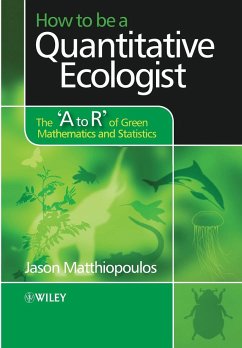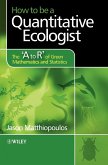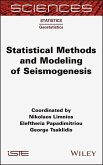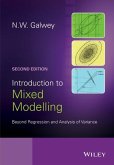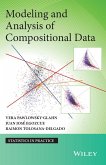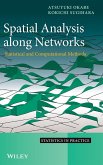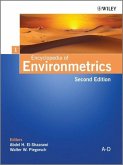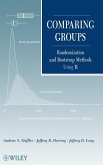The book comprises of two equal parts on mathematics and statistics with emphasis on quantitative skills.
A major component of this book is computer implementation techniques, accompanied by computer practicals using the language R. These provide additional illustrations of the ecological applications of the mathematical and statistical concepts as well as providing basic training in the use of R and in computer programming in general.
Key features:
Introduces concepts fundamental to quantitative ecology research.
A unified approach to maths and stats for statistical modeling.
Explores ecological topics selected from population ecology; spatial ecology, population genetics, trophic ecology, community ecology and behavioural ecology.
Provides basic training in the use of R and in computer programming in general.
Illustrated throughout with ecological examples relating to basic concepts and techniques making this accessible to all readers.
Contains a set of practical exercises on ecological models using R.
Ecological research is becoming increasingly quantitative, yet students often opt out of courses in mathematics and statistics, unwittingly limiting their ability to carry out research in the future. This textbook provides a practical introduction to quantitative ecology for students and practitioners who have realised that they need this opportunity.
The text is addressed to readers who haven't used mathematics since school, who were perhaps more confused than enlightened by their undergraduate lectures in statistics and who have never used a computer for much more than word processing and data entry. From this starting point, it slowly but surely instils an understanding of mathematics, statistics and programming, sufficient for initiating research in ecology. The book's practical value is enhanced by extensive use of biological examples and the computer language R for graphics, programming and data analysis.
Key Features:
Provides a complete introduction to mathematics statistics and computing for ecologists.
Presents a wealth of ecological examples demonstrating the applied relevance of abstract mathematical concepts, showing how a little technique can go a long way in answering interesting ecological questions.
Covers elementary topics, including the rules of algebra, logarithms, geometry, calculus, descriptive statistics, probability, hypothesis testing and linear regression.
Explores more advanced topics including fractals, non-linear dynamical systems, likelihood and Bayesian estimation, generalised linear, mixed and additive models, and multivariate statistics.
R boxes provide step-by-step recipes for implementing the graphical and numerical techniques outlined in each section.
How to be a Quantitative Ecologist provides a comprehensive introduction to mathematics, statistics and computing and is the ideal textbook for late undergraduate and postgraduate courses in environmental biology.
"With a book like this, there is no excuse for people to be afraid of maths, and to be ignorant of what it can do."
--Professor Tim Benton, Faculty of Biological Sciences, University of Leeds, UK
Hinweis: Dieser Artikel kann nur an eine deutsche Lieferadresse ausgeliefert werden.
A major component of this book is computer implementation techniques, accompanied by computer practicals using the language R. These provide additional illustrations of the ecological applications of the mathematical and statistical concepts as well as providing basic training in the use of R and in computer programming in general.
Key features:
Introduces concepts fundamental to quantitative ecology research.
A unified approach to maths and stats for statistical modeling.
Explores ecological topics selected from population ecology; spatial ecology, population genetics, trophic ecology, community ecology and behavioural ecology.
Provides basic training in the use of R and in computer programming in general.
Illustrated throughout with ecological examples relating to basic concepts and techniques making this accessible to all readers.
Contains a set of practical exercises on ecological models using R.
Ecological research is becoming increasingly quantitative, yet students often opt out of courses in mathematics and statistics, unwittingly limiting their ability to carry out research in the future. This textbook provides a practical introduction to quantitative ecology for students and practitioners who have realised that they need this opportunity.
The text is addressed to readers who haven't used mathematics since school, who were perhaps more confused than enlightened by their undergraduate lectures in statistics and who have never used a computer for much more than word processing and data entry. From this starting point, it slowly but surely instils an understanding of mathematics, statistics and programming, sufficient for initiating research in ecology. The book's practical value is enhanced by extensive use of biological examples and the computer language R for graphics, programming and data analysis.
Key Features:
Provides a complete introduction to mathematics statistics and computing for ecologists.
Presents a wealth of ecological examples demonstrating the applied relevance of abstract mathematical concepts, showing how a little technique can go a long way in answering interesting ecological questions.
Covers elementary topics, including the rules of algebra, logarithms, geometry, calculus, descriptive statistics, probability, hypothesis testing and linear regression.
Explores more advanced topics including fractals, non-linear dynamical systems, likelihood and Bayesian estimation, generalised linear, mixed and additive models, and multivariate statistics.
R boxes provide step-by-step recipes for implementing the graphical and numerical techniques outlined in each section.
How to be a Quantitative Ecologist provides a comprehensive introduction to mathematics, statistics and computing and is the ideal textbook for late undergraduate and postgraduate courses in environmental biology.
"With a book like this, there is no excuse for people to be afraid of maths, and to be ignorant of what it can do."
--Professor Tim Benton, Faculty of Biological Sciences, University of Leeds, UK
Hinweis: Dieser Artikel kann nur an eine deutsche Lieferadresse ausgeliefert werden.
"For those looking through R books for something a bit more technical, this book will be an essential accomplice to mastering R." (British Ecological Society, 1 April 2013)
"The book is written in a style that is easy to read and for which one quickly forgets that the examples are essentially mathematical in nature. If you are an ecologist who has shied away from quantitative ecology in the past then this may be the text to convince you that there is much to be learnt from quantitative ecology. I thoroughly recommend this book and trust that you enjoy reading it as much as I did." (International Statistical Review, 2012) "After a course of one or two semesters using this textbook, he says, students should have the absolute minimum of knowledge about quantitative research that ecologists need, but can provide a foundation for students who want to move further in that direction." (Book News, 1 August 2011)
"The book is written in a style that is easy to read and for which one quickly forgets that the examples are essentially mathematical in nature. If you are an ecologist who has shied away from quantitative ecology in the past then this may be the text to convince you that there is much to be learnt from quantitative ecology. I thoroughly recommend this book and trust that you enjoy reading it as much as I did." (International Statistical Review, 2012) "After a course of one or two semesters using this textbook, he says, students should have the absolute minimum of knowledge about quantitative research that ecologists need, but can provide a foundation for students who want to move further in that direction." (Book News, 1 August 2011)

